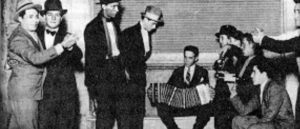Lunfardo: The Slang Dialect of Argentina
By Sarah-Claire Jordan
 As anyone who has studied or traveled around Latin America knows, every country has its own unique dialect of Spanish, complete with fascinating slang words and phrases that can sometimes end up becoming part of the everyday language. In the case of Argentina, however, the slang that developed in Buenos Aires starting in the late 1800s has almost come to define Argentinian Spanish.
As anyone who has studied or traveled around Latin America knows, every country has its own unique dialect of Spanish, complete with fascinating slang words and phrases that can sometimes end up becoming part of the everyday language. In the case of Argentina, however, the slang that developed in Buenos Aires starting in the late 1800s has almost come to define Argentinian Spanish.
What is “lunfardo”?
Lunfardo refers to the slang used originally in Buenos Aires by immigrants from Italy and other European countries. It is speculated that it was conceived by criminals as a way to communicate with each other without the police or prison guards knowing what they were saying, but this hasn’t been confirmed.
The actual term “lunfardo” comes from the Italian word “lumbardo” or “lombardo”, which means someone from the Lombardia region of Italy. Many Italian immigrants at the time came from that region of Italy, and lunfardo may also have developed as a way for them to communicate with each other and preserve their Italian identity while trying to adapt to and survive in a new country.
How did lunfardo become part of Argentinian Spanish?
First, it began to spread among all of the social classes in Buenos Aires, probably thanks to tango and its popularity. Tango lyrics can have very little lunfardo in them, or a lot of lunfardo, but you will always find some in them as a marker of where tango originated. Just like lunfardo, tango music, and the dance that goes along with it, is a mix of the music and dances brought over by European immigrants who settled in Buenos Aires. Tango started off as something relegated to the lower class, but soon it became a ballroom classic, and with it, lunfardo rose among the social classes and into everyday speech.
What are some characteristics of lunfardo?
Given that it was heavily influenced by Italian, you can expect to find a lot of words that originally come from Italian. For example, the word “mina” is used to mean “woman” or “girl” (usually one that is attractive), which can be compared to the Italian word “femmina”, meaning “female” or “woman”. “Fiaca” is another term that comes directly from Italian, with the Italian counterpart being “fiacca” and sharing the meaning “laziness”. Many lunfardo terms are simply normal Spanish words but rearranged, a practice known as “vesre”, or “revés” (reverse/backwards in Spanish). Some of the terms that employ vesre are: “feca” for “cafe”, “gotán” for “tango”, and “lorca” for “calor” (heat). “Jermu” is another “backwards” term, meaning “mujer” (woman).
Is lunfardo still used today?
Many lunfardo terms are still used today, especially in Buenos Aires and the surrounding areas. However, some terms have fallen into disuse, while new terms have been created and adopted. Today, lunfardo can refer to any slang term used in Argentina as well as Uruguay, which shares a similar culture. Some of the more recent lunfardo terms include “zafar” meaning “to barely get by” and “trucho” meaning “fake”, both of which were “rescued” from Old Spanish.
For an overview of our translation expertise, visit our media and marketing translation page.
Category: Foreign Language








